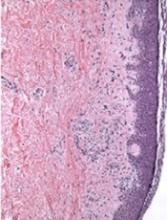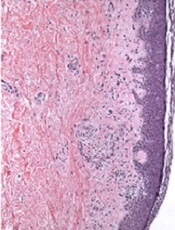User login
The US Food and Drug Administration (FDA) has granted orphan drug designation to KD025 for the treatment of chronic graft-versus-host disease (cGVHD).
KD025 is a Rho-associated coiled-coil kinase (ROCK) inhibitor being developed by Kadmon Holdings, Inc.
The drug is currently under investigation in a phase 2 trial of adults with steroid-dependent or steroid-refractory cGVHD and active disease.
This dose-finding study has enrolled 48 patients divided into 3 cohorts in which patients receive KD025 at 200 mg once daily, 200 mg twice daily, or 400 mg once daily. The patients were enrolled sequentially following a safety assessment of each cohort.
In July, Kadmon Holdings, Inc. released a preliminary analysis of data from the lowest-dose cohort (n=17, 200 mg once daily).
The overall response rate in this cohort was 71% (12/17). Of responders remaining on KD025 through week 24, 89% (8/9) sustained responses. Sixty-seven percent (8/12) of responders saw an improvement in symptoms, as measured by the Lee cGVHD Symptom Scale score.
In addition to the 12 responders, 3 patients had stable disease and were still on KD025 through week 24. So an overall clinical benefit (response and stable disease) occurred in 88% (15/17) of patients.
Sixty-seven percent (8/12) of responders had a reduction in steroid doses, and 67% (4/6) of responders on tacrolimus had a reduction in tacrolimus doses.
There were no drug-related serious adverse events or drug-related elevations in liver function tests reported.
Kadmon Holdings, Inc. plans to present additional data from this study toward the end of this year.
About orphan designation
The FDA grants orphan designation to products intended to treat, diagnose, or prevent diseases/disorders that affect fewer than 200,000 people in the US.
The designation provides incentives for sponsors to develop products for rare diseases. This may include tax credits toward the cost of clinical trials, prescription drug user fee waivers, and 7 years of market exclusivity if the product is approved. ![]()
The US Food and Drug Administration (FDA) has granted orphan drug designation to KD025 for the treatment of chronic graft-versus-host disease (cGVHD).
KD025 is a Rho-associated coiled-coil kinase (ROCK) inhibitor being developed by Kadmon Holdings, Inc.
The drug is currently under investigation in a phase 2 trial of adults with steroid-dependent or steroid-refractory cGVHD and active disease.
This dose-finding study has enrolled 48 patients divided into 3 cohorts in which patients receive KD025 at 200 mg once daily, 200 mg twice daily, or 400 mg once daily. The patients were enrolled sequentially following a safety assessment of each cohort.
In July, Kadmon Holdings, Inc. released a preliminary analysis of data from the lowest-dose cohort (n=17, 200 mg once daily).
The overall response rate in this cohort was 71% (12/17). Of responders remaining on KD025 through week 24, 89% (8/9) sustained responses. Sixty-seven percent (8/12) of responders saw an improvement in symptoms, as measured by the Lee cGVHD Symptom Scale score.
In addition to the 12 responders, 3 patients had stable disease and were still on KD025 through week 24. So an overall clinical benefit (response and stable disease) occurred in 88% (15/17) of patients.
Sixty-seven percent (8/12) of responders had a reduction in steroid doses, and 67% (4/6) of responders on tacrolimus had a reduction in tacrolimus doses.
There were no drug-related serious adverse events or drug-related elevations in liver function tests reported.
Kadmon Holdings, Inc. plans to present additional data from this study toward the end of this year.
About orphan designation
The FDA grants orphan designation to products intended to treat, diagnose, or prevent diseases/disorders that affect fewer than 200,000 people in the US.
The designation provides incentives for sponsors to develop products for rare diseases. This may include tax credits toward the cost of clinical trials, prescription drug user fee waivers, and 7 years of market exclusivity if the product is approved. ![]()
The US Food and Drug Administration (FDA) has granted orphan drug designation to KD025 for the treatment of chronic graft-versus-host disease (cGVHD).
KD025 is a Rho-associated coiled-coil kinase (ROCK) inhibitor being developed by Kadmon Holdings, Inc.
The drug is currently under investigation in a phase 2 trial of adults with steroid-dependent or steroid-refractory cGVHD and active disease.
This dose-finding study has enrolled 48 patients divided into 3 cohorts in which patients receive KD025 at 200 mg once daily, 200 mg twice daily, or 400 mg once daily. The patients were enrolled sequentially following a safety assessment of each cohort.
In July, Kadmon Holdings, Inc. released a preliminary analysis of data from the lowest-dose cohort (n=17, 200 mg once daily).
The overall response rate in this cohort was 71% (12/17). Of responders remaining on KD025 through week 24, 89% (8/9) sustained responses. Sixty-seven percent (8/12) of responders saw an improvement in symptoms, as measured by the Lee cGVHD Symptom Scale score.
In addition to the 12 responders, 3 patients had stable disease and were still on KD025 through week 24. So an overall clinical benefit (response and stable disease) occurred in 88% (15/17) of patients.
Sixty-seven percent (8/12) of responders had a reduction in steroid doses, and 67% (4/6) of responders on tacrolimus had a reduction in tacrolimus doses.
There were no drug-related serious adverse events or drug-related elevations in liver function tests reported.
Kadmon Holdings, Inc. plans to present additional data from this study toward the end of this year.
About orphan designation
The FDA grants orphan designation to products intended to treat, diagnose, or prevent diseases/disorders that affect fewer than 200,000 people in the US.
The designation provides incentives for sponsors to develop products for rare diseases. This may include tax credits toward the cost of clinical trials, prescription drug user fee waivers, and 7 years of market exclusivity if the product is approved. ![]()

